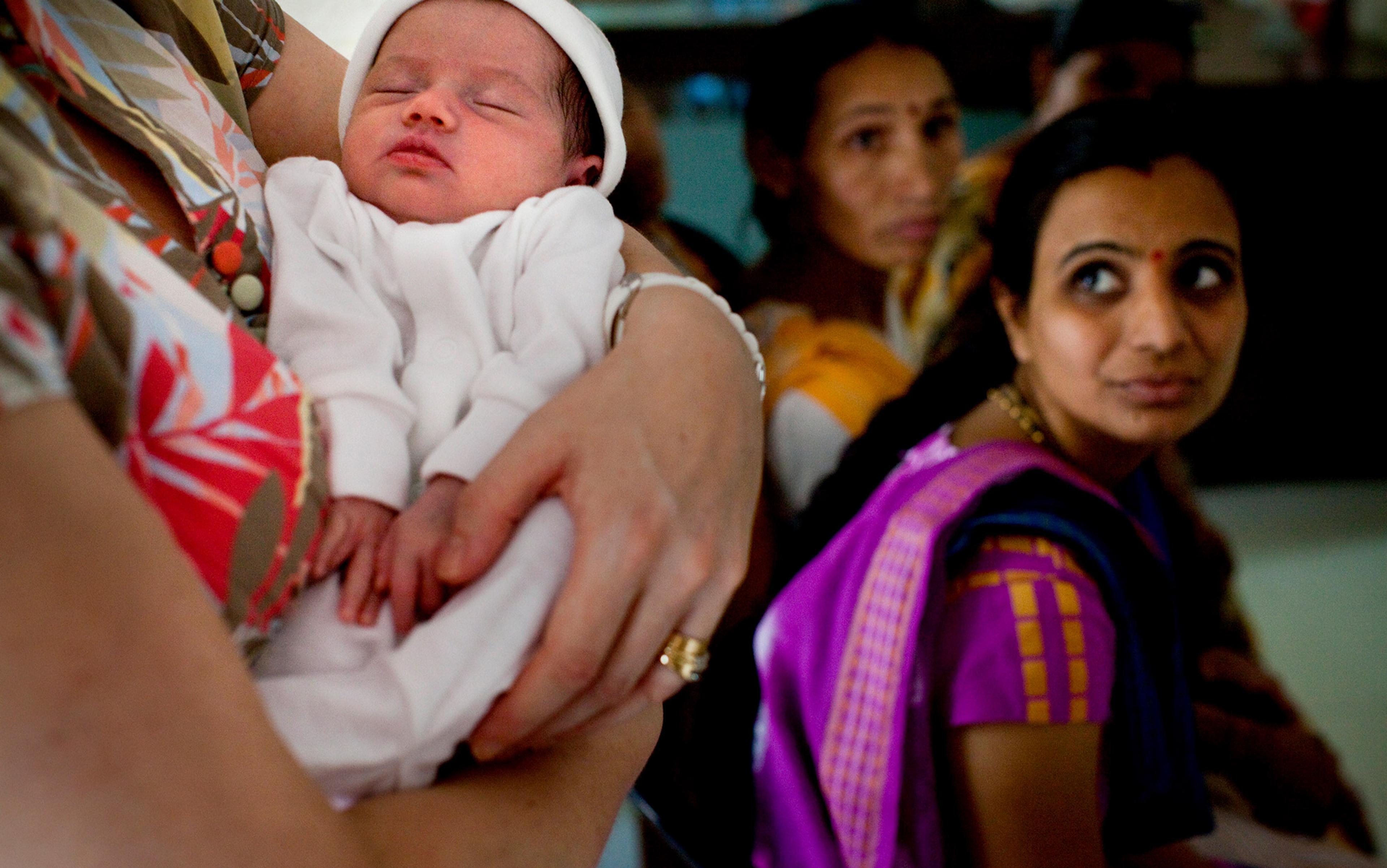Many people want to have children. But they might wonder: is it ethical to bring a child into this broken world, where she might suffer – and partake in – various harms and injustices? Others prefer not to have children. This choice also raises ethical qualms: is it ‘selfish’ to refrain from procreating? Are non-parents failing to contribute to the future of humanity – to the building of the next generation – in a way that we all should if we can?
It is tempting to dismiss such questions on the grounds that whether or not you have kids is a personal matter. It is surely nobody else’s damn business. It’s not up to the government or society to tell me. This question falls securely within the ‘private sphere’ that, in a properly liberal society, other people must respect and leave well enough alone.
True enough. But the mere fact that it is a private matter, something that others have no business deciding for us, does not mean that morality is necessarily silent on the issue. We can each, individually, ask ourselves: what should I do? Are there ethical considerations that we should take into account here – considerations that might help guide us as we attempt to navigate these intensely important, intensely personal questions? And if we do undertake such ethical enquiry, the answers we reach might surprise us.
Is it fair to your would-be child to bring her into a life that will inevitably contain significant amounts of pain, discomfort, suffering and heartache? In his essay ‘On the Suffering of the World’ (1850), Arthur Schopenhauer asked:
If children were brought into the world by an act of pure reason alone, would the human race continue to exist? Would not a man rather have so much sympathy with the coming generation as to spare it the burden of existence? Or at any rate not take it upon himself to impose that burden in cold blood?
Yes, you can expect your child’s life to contain happiness, satisfaction, joy and love. But many would see an asymmetry here all the same. You might think that it’s more important not to harm people than it is to positively help them. Some would go further still, and suggest that we have no intrinsic moral reason to bring more happy lives into existence (such a choice is morally neutral, they claim), whereas we clearly have strong moral reasons to not create an utterly miserable life. If this is correct, a new life of happiness is morally neutral, whereas a new life of misery is morally bad. Since any actual life will contain a mixture of happiness and misery (and hence, on this view, be a mixture of the neutral and the bad), does it follow – as the South African philosopher David Benatar suggests – that any actual life is thereby overall bad?
This inference is too quick. It’s just not plausible to claim that a mostly blissful life, with the odd headache here and there, is ‘bad’ overall. The argument has gone wrong somewhere. Perhaps, as I argue below, we should reject strong claims of an asymmetry between happiness and misery, and recognise intrinsic moral reasons to bring happy lives into existence.
But even if one rejects that response, plausibly what is really bad is not just any old misery, but more specifically, misery that goes uncompensated. While a life that contained nothing but headaches should be avoided, what about a life where the misery is far outweighed by the joy it contains? Even if one denies that happiness is a positive reason to bring a new life into existence, the happiness of the life might nonetheless be morally relevant, by cancelling or undermining the reasons against bringing it into existence that uncompensated misery would have given us.
So we might reasonably doubt that the dictum ‘first, do no harm’ provides such sound ethical advice when it comes to procreative decisions. Any life will, of course, contain some moments of misery. But so long as you can reasonably expect to provide your child with a life that is positive on the whole – one that she will judge, overall, to be worth living – then it doesn’t seem that it could be wrong for the child’s sake to bring her into existence.
Could it be wrong to not have a child? Pope Francis apparently thinks so, earlier this year chiding couples who choose to remain childless as ‘selfish’, and insisting that: ‘A society with a greedy generation, that doesn’t want to surround itself with children, that considers them above all worrisome, a weight, a risk, is a depressed society.’ It’s a confronting claim. And where does the underlying principle stop? Is it also ‘selfish’ to have one child when you could have had two, or two when you could have had three, and so on? Are adults allowed to have no others goals or interests in life beyond ‘surrounding [themselves] with children’? That seems unreasonable.
On the other hand, a happy life is surely valuable, and our ability to contribute such value to the world is surely of some moral significance.
Before we can adequately address this vexed question, and sort out what is right and what is wrong in Pope Francis’ remarks here, a brief theoretical detour is required to separate out different things that might be meant by the claim that people ought to have children (if they can).
We’ve seen that it’s important to distinguish first-personal from third-personal morality: questions of what I should choose to do myself, versus what others can expect or demand of me. A personal decision could be private, in the sense that it should be screened off from the moral scrutiny or criticism of third parties, while leaving room to raise ethical questions from the first-personal perspective of an individual seeking moral guidance.
A second distinction arises within the first-personal perspective and it concerns the strictness of a moral verdict. Suppose I’ve figured out which option is morally best. I could still ask: ‘Do I have to do this? Or is it just something that would be good to do?’ For example, presumably I’m morally required to save a toddler from drowning in a foot of water, or to refrain from murdering people. By contrast, while it might be good to help an old man across the street, it does not seem obligatory.
If the moral verdicts applying to personal procreative decisions are merely moral recommendations, not strict requirements, this might make them seem more palatable. It would go some way to reducing the sense that any moral reflection on these questions is inescapably intrusive and censorious. And, as it happens, some philosophers – from Elizabeth Anscombe to Alastair Norcross – have raised questions about whether the idea of moral requirements even makes sense. (‘Required by whom?’ you might ask.) Perhaps, at bottom, all we can do is consider a scale of options ranging from ‘better’ to ‘worse’. It would seem arbitrary to draw a line at some point along the scale and say: ‘You must do at least this!’
perhaps ethical considerations count against having children while struggling financially, but it’s still OK to decide to have kids in such a situation
On the other hand, it does seem part of our common moral understanding that some actions are wrong in the strict sense, or that they violate standards of minimal decency. It would be appropriate to feel wracked by guilt if you let a toddler drown when you could have helped. By contrast, failing to help the old man across the street might be less than ideal, but is still morally OK. (Isn’t it?)
In most cases, it seems implausibly harsh to think that people should feel guilt or shame over having made the ‘wrong’ procreative decision. So that’s a reason for thinking that most moral verdicts on these issues will take a less strict form. For example, perhaps ethical considerations count against having children while struggling financially, but it’s nonetheless OK to decide to have kids in such a situation – it’s not anything to feel guilty about.
It’s important to recognise this distinction. If we don’t, our aversion to placing strict moral requirements on procreative decisions might lead us to the false conclusion that they are not subject to any kind of moral evaluation at all. But so long as some options are morally better than others, evaluation remains a matter of significant importance. After all, as moral agents, we will generally be interested in acting well, and not merely in avoiding outright moral indecency. Virtue might or might not be its own reward, but we do tend to aspire to more than the bare minimum.
For clarity’s sake, let’s use ‘ought’ to signify that an option is morally good (or recommended from the moral point of view), and restrict ‘obligation’ to the strict sense of moral requirement. We are now in a position to ask: could we be obligated to procreate? There might be far-fetched cases where we can imagine having such an obligation – if the future of all humanity depended on it, say. But what about in more ordinary circumstances?
Suppose you are in an ideal position to raise a flourishing child. You are well-educated, financially secure, have plenty of social support, and so on. (I do not mean to imply that lacking any of these advantages will necessarily prevent a child from flourishing – just that these are advantages, in that they improve the odds that a child will flourish.) Further, suppose that you have a loving disposition, and would certainly care deeply and well for any child you might have. Yet, as it happens, you are ambivalent about the prospect of having children, since you have many other interests and life projects you value, which would be curtailed (at least to some extent) were you to have children.
In these circumstances, if you were to have a child, she would most likely have an excellent life. This seems like a good thing – surely if anything makes the world a better place, it is excellent, flourishing human lives. If you try to imagine two possible universes and evaluate which seems better from the moral point of view, your judgment will surely be influenced by which has the greatest balance of happy, flourishing lives over miserable or even merely neutral ones.
Some philosophers, motivated by concerns about reproductive freedom, push back against this evaluation. The worry seems to be that, if bringing a happy life into existence was a good thing, then there would be some pressure to conclude – absurdly – that women in appropriate circumstances should resign themselves to being baby-making machines, constantly churning out happy babies for the greater good. I agree that we should reject this absurd and morally abhorrent conclusion, but I doubt that denying the value of happy lives is the best way to do it.
We can make some progress just by observing the distinctions noted thus far. (1) Even if procreation were morally required, that wouldn’t make it legitimate to legally or socially enforce. (2) Even if it were required as a matter of first-personal morality, that wouldn’t make one criticisable by third parties for doing otherwise. (3) Even if it were the morally ideal option, that wouldn’t mean that a person was morally required to do it.
it would be demanding and intrusive to ask that an otherwise fortunately situated woman give up her entire life and autonomy to become a living, breathing baby factory
It’s worth elaborating on the latter point. There are all sorts of things it would be morally good to do, but that would involve such great personal sacrifice that nobody could reasonably expect it (of others or of themselves). Donating half your income to the most cost-effective charities, as some in the Effective Altruism movement recommend, would be morally outstanding. Very few people would think to deny this by claiming that helping people in developing countries doesn’t matter, or that the lives saved have no value. So long as the charity really is effective at helping people (with no countervailing unintended consequences), we should grant that supporting it financially would be a very good thing. It’s hard to think of a morally better way to spend the money. Even so, given that it would involve significant personal sacrifice, most people conclude that such altruistic behaviour goes ‘above and beyond the call of duty’. To insist that we must always bring about the most impartial good, forsaking our own life projects, would, it seems, just be too much to ask.
This sort of ‘demandingness constraint’ on plausible moral obligations seems all the stronger when it comes to procreative ethics. It’s one thing to ask us to give up a large portion of our salaries. But it would be still more demanding and intrusive to ask that an otherwise fortunately situated woman effectively give up her entire life and autonomy to become a living, breathing baby factory. Even if it would bring about the most impartial good (which doesn’t seem very likely in any case – there might always be better things she could achieve with her life), such a huge personal sacrifice is simply way too much to ask of anyone. So we can reasonably reject the proposed procreative obligation on that basis.
In short, we can admit that bringing good lives into existence is a good thing, without committing ourselves to implausible procreative obligations. Even if one felt a duty to ‘pay it forward’, and contribute to the future of humanity, there are innumerable ways to do this. Procreating is merely one. Whenever you contribute to society, or act from kindness and concern, you are – in a small way – maintaining and contributing to human civilisation. Even greater long-term impact is possible if you’re willing to make well-targeted charitable donations – for instance to save children’s lives or mitigate global catastrophic risks.
There are all sorts of factors that can reasonably influence your personal procreative choices. Central among these is how you feel about it, and how the prospect of having children fits in with your broader life hopes and plans. (If having kids would make you miserable, for instance, that’s obviously a strong reason against it – both for your sake and for the sake of your potential unwanted child!) What I’ve argued is that, in addition to these obvious personal reasons, there really are distinctively moral reasons to consider as well, since we can – through our procreative choices, as with many other choices – bring an immense amount of value into the world.






